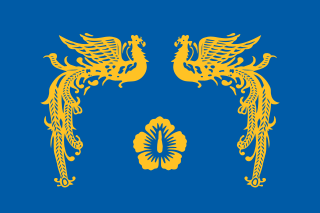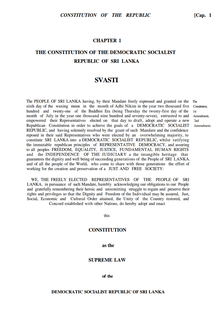
Politics of Kiribati takes place in a framework of a parliamentary representative democratic republic, whereby the President of Kiribati is the head of government, and of a multi-party system. Executive power is exercised by the government. Legislative power is vested in both the government and the House of Assembly. The Judiciary is independent of the executive and the legislature. The Constitution, promulgated at independence on 12 July 1979, establishes the Republic of Kiribati as a sovereign democratic republic and guarantees the fundamental rights of its citizens.

The President of the Republic of Korea is the head of state, head of government, head of the Executive Branch of the Federal Government as well as the commander-in-chief of the Republic of Korea Armed Forces.

The Ceann Comhairle is the chairperson of Dáil Éireann, the lower house of the Oireachtas (parliament) of Ireland. The person who holds the position is elected by members of the Dáil from among their number in the first session after each general election. The Ceann Comhairle since 10 March 2016 has been Seán Ó Fearghaíl, a TD from the Fianna Fáil party.
An alderman is a member of a municipal assembly or council in many jurisdictions founded upon English law. The term may be titular, denoting a high-ranking member of a borough or county council, a council member chosen by the elected members themselves rather than by popular vote, or a council member elected by voters.

The Parliament of Australia is the legislative branch of the government of Australia. It consists of three elements: the Crown, the Senate and the House of Representatives. The combination of two elected chambers, in which the members of the Senate represent the states and territories while the members of the House represent electoral divisions according to population, is modelled on the United States Congress. Through both chambers, however, there is a fused executive, drawn from the Westminster system.

The president of Georgia is the constitutional head of state of Georgia as well as the supreme commander-in-chief of the Defense Forces. The president represents Georgia in foreign relations. The constitution defines the presidential office as "the guarantor of the country’s unity and national independence."

The Constitution of South Africa is the supreme law of the Republic of South Africa. It provides the legal foundation for the existence of the republic, it sets out the rights and duties of its citizens, and defines the structure of the Government. The current constitution, the country's fifth, was drawn up by the Parliament elected in 1994 in the South African general election, 1994. It was promulgated by President Nelson Mandela on 18 December 1996 and came into effect on 4 February 1997, replacing the Interim Constitution of 1993.

The Parliament of Victoria is the bicameral legislature of the Australian state of Victoria that follows a Westminster-derived parliamentary system. It consists of the Queen, represented by the Governor of Victoria, the Legislative Assembly and the Legislative Council. It has a fused executive drawn from members of both chambers. The parliament meets at Parliament House in the state capital Melbourne. The current Parliament was elected on 24 November 2018, sworn in on 19 December 2018 and is the 59th parliament in Victoria.

The Australian Government is the federal government of Australia, a parliamentary constitutional monarchy. The Government is also commonly referred to as simply the Federal Government, and previously, the Commonwealth Government. Like many other Westminster-style systems of government, the Australian Government is made up of three branches: the executive, the legislative, and the judicial.

The State Superintendent of Public Instruction (SPI) of California is the nonpartisan elected executive officer of the California Department of Education. The SPI directs all functions of the Department of Education, executes policies set by the California State Board of Education, and also heads and chairs the Board. The superintendents serves a four-year term, serves as the state’s chief spokesperson for public schools, provides education policy and direction to local school districts, and also serve as an ex officio member of governing boards of the state’s higher education system. The current Superintendent of Public Instruction is Tony Thurmond.

The House of Assembly of Kiribati has 45 members, 44 elected for a four-year term in 23 single-seat and multi-seat constituencies and 1 delegate from the Banaban community on Rabi Island in Fiji.

The Constitution of the Democratic Socialist Republic of Sri Lanka has been the constitution of the island nation of Sri Lanka since its original promulgation by the National State Assembly on 7 September 1978. As of May 2015 it has been formally amended 19 times.

The government of the U.S. State of Oklahoma, established by the Oklahoma Constitution, is a republican democracy modeled after the federal government of the United States. The state government has three branches: the executive, legislative, and judicial. Through a system of separation of powers or "checks and balances," each of these branches has some authority to act on its own, some authority to regulate the other two branches, and has some of its own authority, in turn, regulated by the other branches.

The Oklahoma Corporation Commission is the public utilities commission of the U.S state of Oklahoma run by three statewide elected commissioners. Authorized to employ more than 400 employees, it regulates oil and gas drilling, utilities and telephone companies.
The federal government of Iraq is defined under the current Constitution, approved in 2005, as an Islamic, democratic, federal parliamentary republic. The federal government is composed of the executive, legislative, and judicial branches, as well as numerous independent commissions.

The Constitution of the Republic of Chad is the supreme law of Chad. Chad's seventh constitution, it was adopted in 1996, six years after President Idriss Déby rose to power following a successful rebellion against President Hissène Habré, this formal document establishes the framework of the Chadian state and government and enumerates the rights and freedoms of its citizens. In its current form, the contents of the Constitution include a preamble, 16 parts and 225 articles.
Republicanism in Barbados is a political proposal for Barbados to transition from a parliamentary constitutional monarchy under a hereditary monarch to a republic.
The government of Indiana is established and regulated by the Constitution of Indiana. The state-level government consists of three branches, the judicial branch, the legislative branch, and the executive branch. The three branches share power and jointly govern the state of Indiana. County and local governments are also constitutional bodies with limited authority to levy taxes, pass legislation, and create and maintain local public infrastructure.

The Falkland Islands Constitution is a predominantly codified constitution documented primarily within the Falkland Islands Constitution Order 2008, a statutory instrument of the United Kingdom. The Constitution, in its present form, was made on 5 November 2008 by Queen Elizabeth II in a meeting of the Privy Council at Buckingham Palace. It was laid before Parliament on 12 November 2008 and came into force on 1 January 2009, replacing the 1985 constitution.
The 19th Amendment (19A) to the Constitution of Sri Lanka was passed by the 225-member Sri Lankan Parliament with 215 voting in favor, one against, one abstained and seven were absent, on 28 April 2015. The amendment envisages the dilution of many powers of Executive Presidency, which had been in force since 1978. It is the most revolutionary reform ever applied to the Constitution of Sri Lanka since JR Jayawardhane became the first Executive President of Sri Lanka in 1978.











